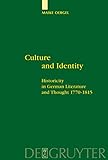Culture and Identity : Historicity in German Literature and Thought 1770-1815 / Maike Oergel.
Material type: TextPublisher: Berlin ; Boston : De Gruyter, [2008]Copyright date: ©2006Description: 1 online resource (300 p.)Content type:
TextPublisher: Berlin ; Boston : De Gruyter, [2008]Copyright date: ©2006Description: 1 online resource (300 p.)Content type: - 9783110189339
- 9783110199970
- Collective memory -- History -- 18th century -- Germany
- Collective memory -- History -- 19th century -- Germany
- Collective memory -- Germany -- History -- 18th century
- Collective memory -- Germany -- History -- 19th century
- German literature -- History and criticism -- 18th century
- German literature -- History and criticism -- 19th century
- German literature -- 18th century -- History and criticism
- German literature -- 19th century -- History and criticism
- Literature and history -- Germany
- Literature and history -- Germany
- Littérature allemande -- Histoire et critique -- 18e siècle
- Littérature allemande -- Histoire et critique -- 19e siècle
- Littérature et histoire -- Allemagne
- Mémoire collective -- Histoire -- 18e siècle -- Allemagne
- Mémoire collective -- Histoire -- 19e siècle -- Allemagne
- Deutschland /Kultur, Künste
- Identität (Politik)
- Kulturelle Identität
- LITERARY CRITICISM / European / German
- Germany/culture and arts, cultural identity, political identity
- 830.9
- PT313
- online - DeGruyter
| Item type | Current library | Call number | URL | Status | Notes | Barcode | |
|---|---|---|---|---|---|---|---|
 eBook
eBook
|
Biblioteca "Angelicum" Pont. Univ. S.Tommaso d'Aquino Nuvola online | online - DeGruyter (Browse shelf(Opens below)) | Online access | Not for loan (Accesso limitato) | Accesso per gli utenti autorizzati / Access for authorized users | (dgr)9783110199970 |
restricted access online access with authorization star
http://purl.org/coar/access_right/c_16ec
This interdisciplinary study examines the impact of the emerging awareness of historicity on the concepts of modernity, identity, and culture as they developed in German thought around 1800. It shows how this awareness determined the German notion of the priority of cultural identity. Key texts from Sturm und Drang, Weimar Classicism, German Romanticism and German Idealism, including Goethe’s Faust I and Wilhelm Meisters Lehrjahre, are contextualised in relation to post-Enlightenment debates on historicity and modernity. The study traces the modification of the Enlightenment concepts of perfectibility and universal ideals to accommodate the new notion of temporal particularity and impermanence. This is achieved by embedding these once static concepts in a historical process that is powered by a self-prompting internal dialectic. Through synthetic absorption within the historical succession the dialectical process allows for the continuity of values, while leaving room for discontinuity and difference by relying on oppositional successions. The study reveals close connections between the intellectual concerns, the literary ambitions, and the endeavours to construct a modern German identity during this period, which suggests a far greater intellectual coherence of the Goethezeit regarding intellectual challenges and objectives than has been previously assumed.
Mode of access: Internet via World Wide Web.
In English.
Description based on online resource; title from PDF title page (publisher's Web site, viewed 17. Dez 2021)


